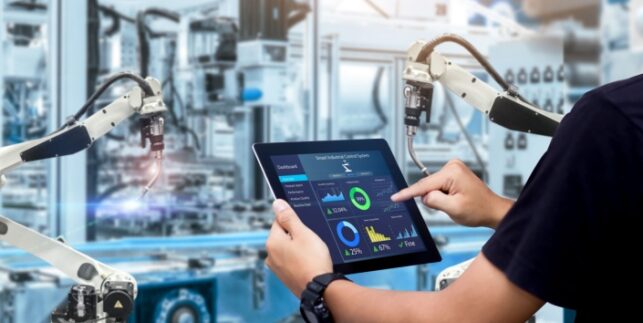Finding the Right Digitalization Solution for Plastics Manufacturing

Digitalization is an ongoing trend in manufacturing that delivers enhanced productivity and efficiency across many different industries. However, not all digitalization solutions are made equal. Manufacturers must ensure that the solution they choose addresses the challenges unique to their sector.
Plastics manufacturing is a sector with stringent quality, efficiency, and turn-around time requirements on the shop floor. Digitalization promises improvements in these and other areas of production, but finding the right implementation is critical. Any plastics manufacturing digitalization solution should include these key features to take operations to the next level.
1. Real-time Monitoring
Different plastics manufacturing methods rely on delicate balances of process temperatures and pressures, precision trimming and cutting, and other production steps with tight tolerances. When something goes wrong and production fails to meet standards, your team needs to know about it as soon as possible to take action and mitigate losses.
Real-time monitoring is a core component of manufacturing digitalization. Aggregating data from all machines on the shop floor and performing real-time analysis improves visibility and lets your team truly understand the state of production. The right digitalization solution will feature instant alerts for production events, giving your team the context and information they need to act immediately.
2. Custom KPIs
Every plastics manufacturing operation is different, meaning that stock KPIs and other metrics aren’t sufficient for your production data management. Instead, you need a solution that lets your team define KPIs in a way that is most impactful on your shop floor. Robust KPI management enables effective benchmarking and continuous improvement.
In plastics manufacturing, defining the appropriate context for KPIs is critical. Any solution your operations put in place should allow for KPIs tied to material and energy consumption for an accurate assessment. With real-time production data, your team can track KPIs continuously rather than only finding out about performance the next day or even later.
3. Recipe Management
Recipe management is an integral part of many production processes but is often one of the most vital elements of plastics manufacturing. Maintaining consistency in raw material use during individual production runs and over longer periods prevents quality issues that can arise from even slight imbalances.
The push to increase recycled content use in plastics manufacturing can make recipe management even more challenging as new recipes and raw materials are put into place. An effective digitalization solution makes recipe management easy and provides real-time monitoring to ensure a match between planned and actual raw material consumption.
4. Predictive Maintenance
Most plastics manufacturing processes rely on molds, dies, and other parts that degrade over time and must be replaced during planned maintenance. Replacing a mold too early increases costs, while replacing it too late can cause defects in production or lead to an unplanned production stop.
The right digitalization solution can enable predictive maintenance to walk this line more effectively. Production data analysis over time can highlight changes in quality, energy consumption, and other areas that indicate wear or other issues. Once alerted, your team can integrate those maintenance requirements into their maintenance schedule rather than facing a sudden production stop.
5. Production Scheduling
Plastics manufacturing operations involve a complex interplay of different machines and production lines. Developing an optimal schedule that maximizes available resources can be a significant challenge when work orders have tight turn-around times. In packaging and other sectors that carry out custom orders, the stock is made-to-order and often requires changes to scheduling on-the-fly.
An effective digitalization solution can make optimizing production scheduling trivial for your production team. Schedules can be created for current and future jobs based on historical data on machine performance. You can ensure that machines and operators are put to their most efficient use in any given situation, along with integrating setup instructions and parameters to streamline jobs further.
6. Integrated Communications
Your plastics manufacturing operations rely on a variety of production team members in different roles. Maintaining proper communication is vital to address issues as they arise. However, keeping track of communications and ensuring availability can be difficult.
A digitalization solution with integrated communications makes it easy to keep track of all communications. They can be tied to specific machines or other parameters to ensure that proper context is always available. Consolidating communications in one solution that works across multiple devices also provides availability, whether at workstations, throughout your facility, or even remotely.
7. Scalability
Plastics manufacturing is a sector that demands agility. Your operations must be ready to scale as demand ebbs and flows, capitalizing on opportunities when they arrive. This might mean adding new machines or even establishing new facilities, and you need a digitalization solution that can handle that seamlessly.
Scalability in a digitalization solution ensures that your operational intelligence and work management are never the limiting factor in your expansion. You can add new machines, modify production lines, or even add new facilities and carry over your custom recipes, KPIs, workflows, and more.
8. Seamless Implementation
Making big changes on your shop floor can often mean significant downtime and associated revenue loss. However, the right digitalization solution can allow for seamless implantation that may not require any production stop at all. Digitalization solutions work with your existing machines and solutions, allowing for versatile implantation on any shop floor.
Your digitalization solution can make use of existing infrastructure or establish a wireless network to enable machine connectivity from scratch. Legacy machines without any modern connectivity features are also easily integrated. By working with the right partner to digitalize your shop floor, you can realize a solution that provides what you need without disrupting your process.
Realize the Benefits of Digitalization in Plastics Manufacturing With Matics
Matics Real-time Operational Intelligence (RtOI) is a digitalization solution that enables manufacturers from a wide range of sectors to improve productivity and efficiency through real-time monitoring, work management tools, and more. Our solution is already at work in plastics manufacturing facilities around the world, addressing unique challenges throughout the industry.
Our team can implement Matics RtOI no matter the state of your shop floor, whether you’re facing limited connectivity, no connectivity, legacy machines, and other challenges. We’ll work with you to deliver the full benefits of digitalization without disrupting your shop floor. Schedule a demo with our team today for more on Matics RtOI.





